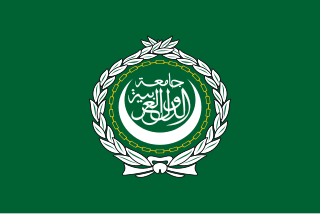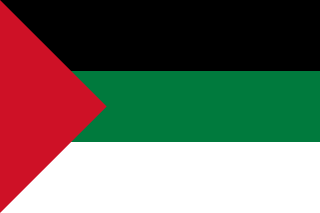
The Arab League, formally the League of Arab States, is a regional organization in the Arab world, which is located in Northern Africa, Western Africa, Eastern Africa, and Western Asia. The Arab League was formed in Cairo on 22 March 1945 initially with six members: Egypt, Iraq, Transjordan, Lebanon, Saudi Arabia, and Syria. Yemen joined as a member on 5 May 1945. Currently, the League has 22 members, but Syria's participation has been suspended since November 2011.

Ahmad al-Shukeiri also transcribed al-Shuqayri, Shuqairi, Shuqeiri, Shukeiry, etc.), was the first Chairman of the Palestine Liberation Organization, serving in 1964–67.
The Arab League was formed in Cairo on 22 March 1945 with six members: Egypt, Iraq, Transjordan, Lebanon, Saudi Arabia, and Syria. Yemen joined on 5 May 1945. Since its formation the Arab League has promoted the Palestinian Arab cause in the Israeli–Palestinian conflict, including by imposing the Arab League boycott of Israel. The Arab League opposed the United Nations Partition Plan for Palestine in 1947. On 15 May 1948, the then seven Arab League members coordinated an invasion of what was by then the former British Mandate, marking the start of the 1948 Arab–Israeli War.

MENA is an English-language acronym referring to the Middle East and North Africa. It is alternatively called the WANA, referring to larger West Asia and North Africa region. The MENA acronym is often used in academia, military planning, disaster relief, media planning as a broadcast region, and business writing. Moreover, the region shares a number of cultural, economic and environmental similarities across the countries; for example, some of the most extreme impacts of climate change will be felt in the region.

Arab League–Iran relations refer to political, economic and cultural relations between the mostly Shia Persian country of Iran and the mostly Sunni Muslim and Arab organization Arab League.

The Arab Parliament is the legislative body of the Arab League. At the 19th Arab League Summit in Amman, the Arab states agreed to create an Arab Parliament, and came up with a resolution to give Amr Moussa the Secretary General of the Arab League the power to start and create the Parliament. In 2004, in the ordinary Arab League Summit in Algiers was the official date where all Arab League Members agreed to send their representative to the temporary Parliament sessions that took place in the headquarters of the Arab League in Cairo, Egypt, with each member state sending four members, until the Parliament is reassigned permanently to its under-construction office in Damascus.
Arabic Industrial Development and Mining Organization (AIDMO)(Arabic: المنظمة العربية للتنمية الصناعية والتعدين)

The 1964 Arab League summit was the first summit of the Arab League, held in Cairo, Egypt, on 13–16 January 1964 and attended by all thirteen of the then member states: United Arab Republic (Egypt), Iraq, Lebanon, Syria, Saudi Arabia, Jordan, Yemen Arab Republic, Libya, Sudan, Morocco, Tunisia, Kuwait and Algeria.

The 1965 Arab League Summit was a secret summit held from September 13 to 17 in Casablanca, Morocco. It was the third meeting of the Council of Heads of Member States of the Arab League. The summit was boycotted by Tunisia over disagreements with Egypt.
The Demographics of the Middle East describes populations of the Middle East or the Greater Middle East that includes Northern Africa.

This is a list of the competitive matches played by the Syrian football team since its inception.
The Arab Cold War was a period of political rivalry in the Arab World from the early 1950s to the late 1970s as part of the broader Cold War. The generally accepted beginning of the Arab Cold War was the Egyptian Revolution of 1952, which ultimately led to Gamal Abdel Nasser becoming President of Egypt in 1956. Thereafter, newly established Arab republics defined by revolutionary secular nationalism, and largely drawing inspiration from Nasser's Egypt, were engaged in political rivalries of varying degrees of ferocity with conservative traditionalist Arab monarchies, led chiefly by Saudi Arabia. The approximate end point of this period of internecine rivalry and conflict is generally viewed as being the 1979 Iranian Revolution, which culminated in the installation of Ayatollah Ruhollah Khomeini as the leader of Iran's theocratic government. Thereafter, the bitterness of intra-Arab strife was eclipsed by a new era of Arab-Iranian tensions.

The Arab League has 22 member states. It was founded in Cairo in March 1945 with six members: the Kingdom of Egypt, Kingdom of Iraq, Lebanon, Saudi Arabia, Syrian Republic, and Transjordan. North Yemen joined on 5 May 1945. Membership increased during the second half of the 20th century. Seven countries have observer status. The headquarters are located in Cairo, Egypt.
The International Prize for Arabic Fiction Nadwa is an annual writers' workshop for young writers from the Arab world. Held under the aegis of the International Prize for Arabic Fiction, the nadwa is the first such workshop for Arab writers and has been an annual event since 2009.

Arab nationalism is a nationalist ideology that asserts the Arabs are a nation and promotes the unity of Arab people, celebrating the glories of Arab civilization, the language and literature of the Arabs, and calling for rejuvenation and political union in the Arab world. Its central premise is that the people of the Arab world, from the Atlantic Ocean to the Indian Ocean, constitute one nation bound together by common ethnicity, language, culture, history, identity, geography and politics. One of the primary goals of Arab nationalism is the end of Western influence in the Arab world, seen as a "nemesis" of Arab strength, and the removal of those Arab governments considered to be dependent upon Western power. It rose to prominence with the weakening and defeat of the Ottoman Empire in the early 20th century and declined after the defeat of the Arab armies in the Six-Day War.
The Arab Athletics Federation is an international governing body for the sport of athletics.
The 2017 Arab League Summit was held in Jordan between 23 and 29 March 2017.
The Federation of Arab News Agencies (FANA), a branch of the Arab League, is a membership organization for Arabic-language, national news agencies, currently of 18 or 19 members and established in 1975 in Beirut, Lebanon.










